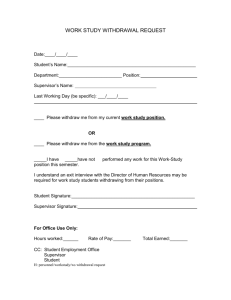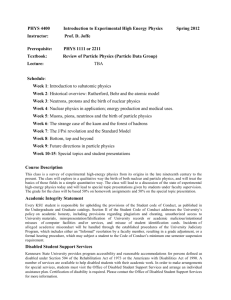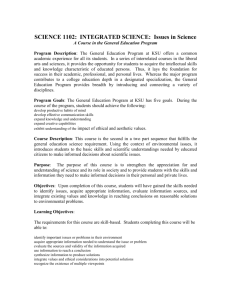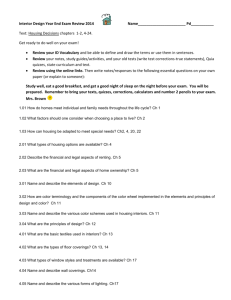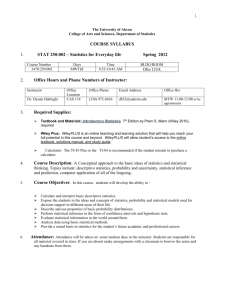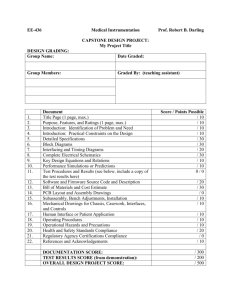BIOL 3320L/01 - Kennesaw State University College of Science and
advertisement
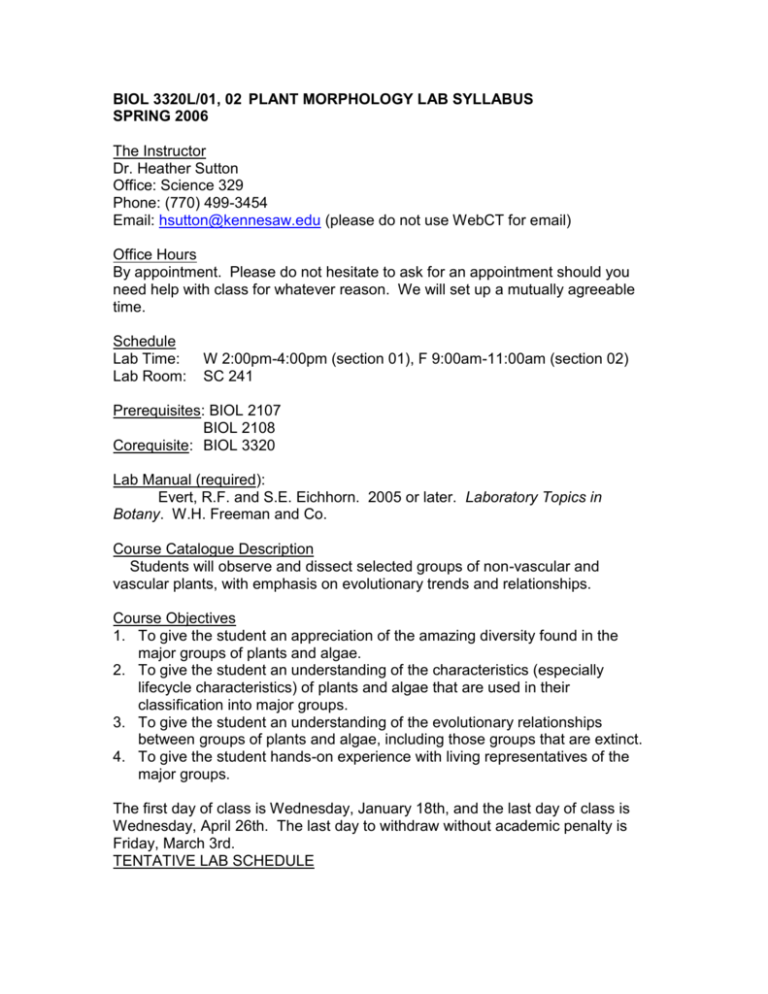
BIOL 3320L/01, 02 PLANT MORPHOLOGY LAB SYLLABUS SPRING 2006 The Instructor Dr. Heather Sutton Office: Science 329 Phone: (770) 499-3454 Email: hsutton@kennesaw.edu (please do not use WebCT for email) Office Hours By appointment. Please do not hesitate to ask for an appointment should you need help with class for whatever reason. We will set up a mutually agreeable time. Schedule Lab Time: Lab Room: W 2:00pm-4:00pm (section 01), F 9:00am-11:00am (section 02) SC 241 Prerequisites: BIOL 2107 BIOL 2108 Corequisite: BIOL 3320 Lab Manual (required): Evert, R.F. and S.E. Eichhorn. 2005 or later. Laboratory Topics in Botany. W.H. Freeman and Co. Course Catalogue Description Students will observe and dissect selected groups of non-vascular and vascular plants, with emphasis on evolutionary trends and relationships. Course Objectives 1. To give the student an appreciation of the amazing diversity found in the major groups of plants and algae. 2. To give the student an understanding of the characteristics (especially lifecycle characteristics) of plants and algae that are used in their classification into major groups. 3. To give the student an understanding of the evolutionary relationships between groups of plants and algae, including those groups that are extinct. 4. To give the student hands-on experience with living representatives of the major groups. The first day of class is Wednesday, January 18th, and the last day of class is Wednesday, April 26th. The last day to withdraw without academic penalty is Friday, March 3rd. TENTATIVE LAB SCHEDULE LAB DAY: Jan 11 January 18 January 25 February 1 February 8 February 15 February 22 March 1 March 8 March 15 March 22 March 29 April 5 April 12 April 19 April 26 LAB: Chapter in Lab Manual No Lab Microscopy, Cyanophyta 1, 10-7 to 10-9 Protista 1 (Slime Molds, Euglenoids, Red Algae) 12 No lab Protista 2 (Heterokonts) 13 (13-1 to 13-6) Protista 2 (Green Algae Part 1) 13 (13-6 to 3-10) Protista 2 (Green Algae Part 2) 13 ( 13-10 to end) LAB EXAM SPRING BREAK-NO LAB Bryophytes 14 Fern Allies 15 Ferns 16 Atlanta Botanical Gardens Trip Gymnosperms 17 Angiosperms: Flowers 18 LAB EXAM Fruit lab (lab 19) will be done in lecture towards the end of the semester. Laboratory Preparation You should always read the lab manual chapter over before coming to lab. It would be VERY helpful to have your textbook with you also. Bring some blank sheets of drawing paper to make notes and draw on. Keep these sheets in a loose-leaf notebook. Using pencils for your drawings is suggested. A sharp, 3H or 4H pencil would be best. DO NOT USE LINED PAPER! Lab Notes and Drawings Plant morphology labs do not have formal lab reports. Instead, during the lab, you will be answering questions in your lab manual, and making drawings and notes as outlined in a handout at the beginning of each lab. It is to your benefit to make your notes and drawings as complete, neat, and accurate as possible, as these will be a large part of the material you will use to study for the lab exams. To encourage you in this, I will randomly select up to 6 people near the end of each lab, to hand in their notes and drawings from that lab. You can expect to have your notes checked a number of times over the course of the semester. Each student will start out with a full 15% for lab notes. By doing a good job in all labs it should be easy for you to keep most of that 15%. You are encouraged to discuss lab material amongst yourselves. However, the lab notes you turn in must be your own work. Labs will be graded on their accuracy, completeness, neatness, and thoroughness. If you have any questions about the grading of lab notes, please discuss it with me soon after they have been handed back to you. Laboratory Drawings Drawings are one way to record observations and data. Drawings provide evidence of your comprehension of the laboratory material. Captions and labeling of the drawings provide an opportunity to consolidate and clearly state the significance of the observations you have been making. They will be a very useful aid in studying for the lab examinations. Some of you may be concerned about your artistic ability (or lack thereof), and how that may affect your grade in lab. By putting in some effort, everyone should be able to make adequate drawings in lab. If you feel you need help with your drawings, or are unsure as to whether they are acceptable, please ask for help. Laboratory Attendance Attendance is required in that I will not accept lab notes from those who were absent from that lab. Missing labs will decrease your chances of doing well on the lab exams, since these will be based on the material you are to look at and draw in lab. Many labs will be difficult to make up because in many cases the cultures of organisms will be viable for only a few weeks. Making up a lab will require a lot more work on your part than if you had gone to the original lab, and I will not necessarily be around to answer questions that you may have. For those who have an acceptable excuse (prior arrangement, doctor’s note) I will attempt to provide a make-up lab but THERE ARE NO GUARANTEES THAT THIS WILL BE POSSIBLE. It is to your benefit not to miss lab unless ABSOLUTELY necessary. Quizzes A number of quizzes on the lab material will be given during the semester at the beginning of lab. The quiz will be announced a week ahead of time. Quizzes should help you to keep up with the material and thus help you to prepare for the lab exams. Make-up quizzes will only be available for those with an acceptable excuse as described above under “Laboratory Attendance”. Laboratory Exams Laboratory exams constitute a large portion of your grade in BIOL 3320L, and should be taken very seriously. Advanced preparation (throughout the semester) is highly recommended. A number of students in the past have had to retake the lab portion of this course, and have even delayed their graduation, due to not taking this advice. More information on the laboratory exams will be given later in the semester. Atlanta Botanical Gardens There is $ 7 fee for students (bring your student card). More information about the ABG can be found at www.atlantabotanicalgarden.org Further information about the trip will be given later in the semester. Evaluation: Lab Exam 1 Lab Exam 2 Quizzes Notes and Drawings 35% 35% 15% 15% 100% A>90% B>80% C>70% D>60% F<60% Lab Safety: Please follow the lab safety rules as posted on the lab door and at: http://science.kennesaw.edu/biophys/LabSafetyGuideNoPic.doc Changes to Syllabus Any changes to this syllabus will be made in writing and distributed to the class at least one week in advance of the change going into effect. ACADEMIC WITHDRAWAL POLICY Students may withdraw from one or more courses anytime before the last three weeks of the semester. However, as of Fall 2004, students will be allowed a maximum of eight total withdrawals if they enter KSU as a freshman. Transfer students will be allowed one withdrawal per fifteen credit hours attempted, for a maximum of eight. Students who choose to pursue a second degree at KSU will be allowed two additional withdrawals. Students who entered KSU before the Fall of 2004 will be allowed one withdrawal per fifteen credit hours attempted for a maximum of eight. To withdraw, the student should complete an official withdrawal form in the Office of the Registrar. Students who officially withdraw from courses on or before the last day to withdraw without academic penalty will receive a “W”. Students who officially withdraw after the last day to withdraw without academic penalty (and before the last three weeks of the semester) will receive a “WF”, which will be counted as an “F” in calculation of their grade point average. The only exceptions to these withdrawal regulations will be for instances involving unusual circumstances, which are fully documented. Students may appeal to the academic standing committee for consideration of unusual circumstances. LAST DATE TO WITHDRAW WITHOUT ACADEMIC PENALTY SPRING 2006 MARCH 3, 2006 Academic Integrity Every KSU student is responsible for upholding the provisions of the Student code of Conduct, as published in the Undergraduate and Graduate catalogs. Section II of the Student Code of Conduct addresses the University’s policy on academic honesty, including provisions regarding plagiarism and cheating, unauthorized access to University materials, misrepresentation/falsification of University records or academic malicious/intentional misuses of computer facilities and/or services, and misuse of student identification cards. Incidents of alleged academic misconduct will be handled through the established procedures of the University Judiciary Program, which includes either an “Informal” resolution by a faculty member, resulting in a grade adjustment, or a formal hearing procedure, which may subject a student to the Code of Conduct’s minimum one semester suspension requirement.

